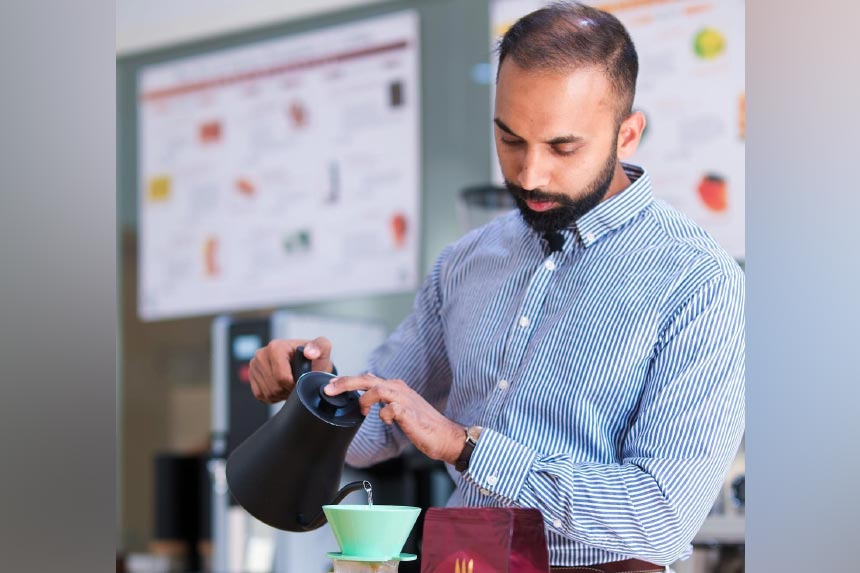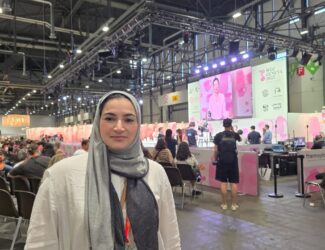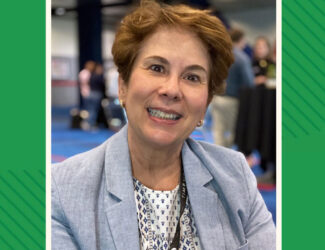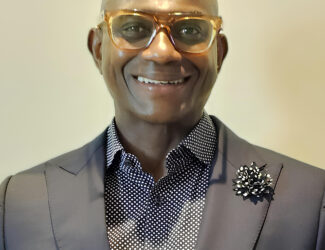
A journey into the depths of a specialty coffee lover… Syed Naveed opens his heart to the “QahwaWorld” in this special interview
Coffee, a ubiquitous beverage, often consumed for its comforting aroma and energizing effects. But have you ever pondered the intricate world of specialty coffee, where each cup tells a unique story? Our interviewee embarked on this remarkable journey, inspired by the allure of specialty coffee and a stroke of luck.
In March 2019, he won a Coffee Master Class competition at the renowned London Dairy Bistro (now known as LDC Kitchen + Coffee), despite having no prior knowledge of what specialty coffee truly entailed. Little did he know that this fortuitous moment would lead them down a rabbit hole of discovery.
As we delve deeper into this interview, you’ll learn about his journey into the coffee industry, his exploration of the coffee value chain, and the origins of “The Need for Coffee” blog. he will share memorable experiences and insights gained from experts in the field, providing a glimpse into the passionate world of specialty coffee.
So, join us as we uncover the intricacies of the coffee industry through the eyes of a Mr. Naveed and learn how he balance hi deep love for coffee with other commitments in life. If you’re curious about specialty coffee, its evolving future, and the flavors that have left an indelible mark, this interview is your window into a world where coffee is not just a beverage but a captivating journey.
Mr. Naveed, how did you enter the beautiful world of coffee?
I entered the world of specialty coffee by chance after attending an advanced training course, and was immediately fascinated by the intricacies of the coffee value chain. I then started sharing my coffee experiences and knowledge from industry experts on my blog called The Need for Coffee, and I also began writing for FLTR Magazine and Coffee t&i Magazine.
Mr. Naveed What inspired you to attend that masterclass and delve into the world of specialty coffee?
I had no idea what specialty coffee was and my interest piqued when I won a Coffee Master Class in a competition with London Dairy Bistro, now known as LDC Kitchen + Coffee, in March 2019. I guess it was luck that I chanced upon this industry.
Can you share some of the most intriguing aspects of the coffee value chain that you discovered during your journey?
One of the most talked about factors at the origin is the impact of climate change on coffee production, affecting both quality and quantity. Then comes the issue of the complex supply chain involving various stakeholders, from small farmers to importers and exporters, and how it can all influence pricing and transparency. The growing trend of specialty coffee and the unique flavors from different processing is the most exciting for me at the consumer end. And lastly, how it all comes together. Let me give you an example which happened recently. I was at a local roastery enjoying filter coffee. When I found out about the coffee brewed for me, I came to this realization that I have met all stakeholders involved; producer, importer, roaster, and me — consumer.
How did the idea for “The Need for Coffee” blog come about, and what do you hope to achieve with it?
I have been posting about various things on Instagram as far as I remember. Naturally when I discovered a whole new world with specialty coffee, I started documenting it on Instagram until Lameen Abdul Malik aka fromcoffeewithlove planted the idea of starting a blog. I have to give him credit for that.
Could you describe some of the most memorable experiences you’ve had while exploring the coffee industry?
When I first started exploring cafes, I was very intrigued when it came to brewing coffee and watched closely what was happening behind the barista bar. I not only wanted to learn and analyze the barista’s work flow and spot any unusual way of brewing coffee but also know them as a person.
Sharing my thoughts with our friends behind the bar helped me with two things, he/she knows that I am serious about drinking well prepared coffee. Second, the conversation always leads to their coffee journey. That lead to interviewing them and highlighting their story, some of which are on my blog.
What has been the most challenging part of becoming a coffee enthusiast and sharing your knowledge with others?
One of the primary reasons for writing on my blog is to share knowledge acquired from industry professionals. Little did I know that specialty coffee is a never ending rabbit hole, from the origins of coffee to brewing techniques and that is just scratching the surface. Staying up to date with the constantly evolving coffee industry can be daunting or overwhelming at times. But for me, that is not the issue. I always believe that complex
concepts should be conveyed in an understandable and engaging format. This does require effective communication skills which I’m still learning to this very day.
How do you stay updated with the latest developments and trends in the coffee industry?
I have two ways of staying up to date.
I listen to a lot of podcasts since I am always out and about. I have made a list of my top coffee podcasts I listen to here.
I am also an avid reader, and there are only two coffee magazines I have been reading for some time now: Standart and coffee t&i magazine. I love the design aspect and the writing style.
Can you share some of the key insights or lessons you’ve learned from the experts you’ve interacted with in the industry?
- Specialty coffee prioritizes quality over quantity. Care is taken to grow the coffee trees, only ripe cherries are picked, systematically processed, skillfully roasted and brewed to highlight unique flavor profiles.
- Specialty coffee roasters establish and value direct relationships with coffee producers and farmers to ensure fair compensation, sustainable practices and higher quality.
- Distinct flavor profiles can be experienced from different coffee growing regions. Even coffee from the same origin but different areas can have a vast difference in their tasting notes.
- The specialty coffee industry emphasizes environmentally and socially responsible practices.
- Continuous development in the industry leads to continuous learning amongst enthusiasts and professionals who value ongoing education about coffee.
- Baristas and roasters are considered artisans and value the art of brewing and roasting to create the perfect cup of coffee.
- Constant experimentation and innovation in processing, brewing methods and new equipment keep the industry buzzing and dynamic.
- The specialty coffee community is the heart of the industry. It is passionate when it comes to sharing knowledge and fostering a sense of belonging even amongst newcomers.
What topics or aspects of coffee do you enjoy writing about the most for FLTR Magazine and coffee t&i magazine?
The Chief Editor of FLTR Magazine is flexible when it comes to writing articles. With coffee t&i magazine, the editor sends me topics to choose from. This time I wanted to step out of my comfort zone and challenge myself to write more than one article for the latest issue.
How do you see the future of the specialty coffee industry evolving, and what role do you think your blog and writing will play in it?
The future of the specialty coffee industry is evolving in several ways:
- There is an increasing emphasis on sustainability, from farm to cup, and a focus on reducing the environmental impact of coffee production.
- Coffee brewing equipment are designed to make it easier for enthusiasts at home to achieve consistent and high-quality results like a cafe.
- Consumers understand transparency in the coffee supply chain, and are aware of issues like fair compensation and ethical sourcing.
- Continuous education and appreciation for coffee quality and origins are driving consumer interest in exploring diverse coffee flavors.
- Accessibility of specialty coffee is expanding beyond major cities, reaching rural areas and smaller communities, collaborating with different services such as flowers shops, libraries etc.
- Influx of small, independent, artisanal coffee shops offering unique coffee tasting experiences.
The future of the specialty coffee industry is indeed promising, and highlighting these aspects which I often do on my blog educates newcomers and also offers a fresh perspective.
For someone who is just beginning to explore the world of specialty coffee, what advice or resources would you recommend?
Every journey is unique but if I had to do it all over again, I would interact with our friends behind the bar — the baristas. Many of them out there, you know who you are, have taught me all I know about specialty coffee. I have probably learnt more from them than I have studied on my own.
Are there any specific coffee regions or varieties that have left a lasting impression on you? If so, which ones and why?
Colombian coffee has always stood out for their unique processing methods with really exceptional coffees being served here locally. I have been blessed and lucky to even try some of the coffees used in competitions.
There’s another origin that has caught my attention and that’s Yemen. It’s an origin equally unique and renowned in taste. It’s considered as the birthplace of coffee and the country has a long history of cultivating coffee.
There’s often a mysterious aura revolving around Yemeni coffee, perhaps it is the limited supply or the complexity of its rich tasting notes considered to be in the same pedigree as the Panama Geisha. It’s a heated debate that coffee enthusiasts get into but these two origins have been my all time favorites.
How do you balance your passion for coffee with your other commitments and responsibilities?
I get asked this question often and the short answer would be to divide my day into parts and assigning those parts to different commitments in your life.
I wake up quite early, and my first part of the day is blocked for some light reading and content creation. This would also include writing for my blog or an article.
The next slot is getting ready for the day, spending time with the family, a brief workout session and heading to work.
Towards the evening, I’ll spend another hour or so reading and creating content. After that, it’s family time again till I retire for the night. A balanced approach is important



